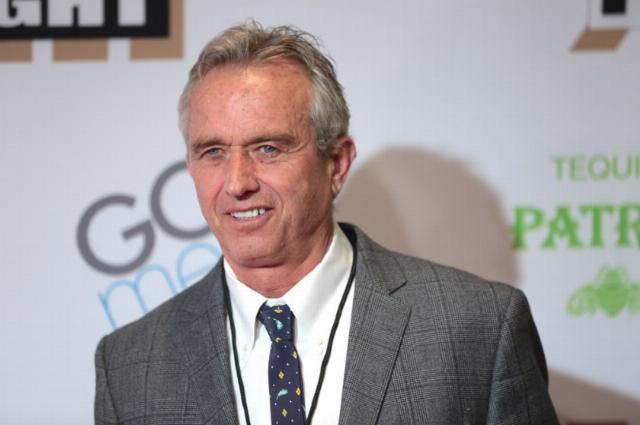

Photo Credit: Image: Robert F. Kennedy, Jr. Credit: Gage Skidmore via Flickr, CC BY-SA 2.0.
Gage Skidmore
What are we to make of Kennedy getting booted off the ballot in New York?For months, election-watchers have wondered: will Robert F. Kennedy, Jr. make it onto enough states’ ballots to have an impact? Will he have the money to run a real campaign? And most importantly, who will he hurt more: Donald Trump or Kamala Harris?
One thing most didn’t expect was what happened on Monday, August 12: he was bounced from the ballot in the state he grew up in, on a technicality.
Now, election law has always been full of technicalities, and some of us would argue that there’s nothing wrong with that. Government is about compliance with the law, and if you’re too sloppy to comply on your very first responsibility — the paperwork that creates your candidacy — then arguably, you shouldn’t be in charge of writing, implementing, or enforcing the law.
Those of us who have been in politics a while have seen candidates bounced from the ballot for forged signatures on petitions, for missing a declaration or two, or even for incomplete pagination on the filing packet. And we usually don’t mind, as odd as it seems to outsiders, because we argue that if the candidate can’t be trusted to get these fundamentals right, then we can’t really trust him to keep campaign promises, or to notice pork that other pols sneak into bills, or to hold agencies to the line in department oversight.
But this week’s news was such a consequential violation that it was rather surprising.
RFK Jr’s nominating petitions identified him as a resident of New York State. A Democrat front group challenged his candidacy, claiming he doesn’t actually live in New York at all, and a judge ruled against him.
As it turns out, RFK Jr. has lived in California for the past ten years and only recently decided to rent a bedroom in New York state from a friend — a bedroom in which he has spent only one night since the verbal agreement commenced, apparently in May.
He admits that he has lived in California since 2014, to be with his wife, kids, and pets, but he always “intended” to return to New York someday (he’s 70), and he has always “thought of himself as a New Yorker” anyway. One is tempted to say that, in modern parlance, despite living in California, he “identifies” as a New Yorker, and that should be good enough.
This raises a completely new set of questions.
First, regarding the election paperwork, if the reports are true — and they appear to be undisputed — his campaign put this friend’s bedroom on his campaign paperwork as his residence. It’s a lie. There’s no other way to put it.
So as election paperwork goes, this is about as big a thing as a candidate can get wrong. Elected officials are caught and bounced out of office all the time, in municipal and even state legislative seats, when proven to live outside their districts. Why should a candidate for president be different?
Next, regarding why it matters especially in a presidential race, RFK Jr. isn’t running alone. Unlike legislative offices, candidates for president and vice president must run as a team. RFK Jr. selected a running mate from California: the very wealthy Nicole Shanahan. If he’s from New York and she’s from California, there’s no problem. But if they’re both from California, that’s a big problem.
Our system is designed to encourage (read: force) at least some degree of geographical diversity. Each member of the Electoral College is specifically banned from voting for two candidates from his own state. This means that if both candidates are from California, and they win the state of California in the General Election, the electors of the state of California would be unable to vote for their ticket.
With California being the biggest prize in the Electoral College, it would be insane to run that risk, and it’s inconceivable that RFK Jr. and his campaign staff didn’t know about it. It follows that they had to decide on the New York filing as an intentional scheme to skirt the law. It’s a shortsighted, embarrassingly amateurish scheme, but still, a clearly intentional one.
Some claim that the Constitution is out of date, that its rules have long been discarded. As tragic as it is to admit, too many in our country do treat it that way. But the law of the land is still the law of the land. It has never been overturned. So this requirement in the Electoral College still stands.
As recently as the presidential election of 2000, when Texas governor George W. Bush wanted to name Wyoming politician Dick Cheney as his running mate, at a time when Cheney had been living in Texas for a few years. Cheney famously flew back to his house in Wyoming to change his registration back in time, so that they would legally be from separate states, in compliance with the law.
And as recently as this very summer, as President Trump considered his own potential running mates, the fact that he currently lives in Florida was high on the list of reasons he couldn’t consider Senators Scott or Rubio, Congressman Donalds, or Governor DeSantis, all of whom would bring a lot to the ticket, but all of whom are fellow Floridians and would necessitate a formal move for one or the other of them.
Because it’s the law.
Where does the RFK Jr. campaign go from here? (Note: I happen to subscribe to the belief that he hurts Harris more than he hurts Trump, so I’m personally hoping he finds a way to stay in, but it’s not easy. And I could be wrong.)
Finally, this situation raises a couple of other questions about the rule.
The Framers set the rule in place for a reason. They wanted our presidents and vice presidents to come from different states, and to be known to different local politicians, both to provide geographical diversity in office and to increase the odds that a bad nominee (a traitor, an autocrat, a lunatic, a crook, whatever) would be exposed in time to stop his election.
It’s really not about committing to rent an apartment somewhere if you win; it’s about coming from a place where you are well known already. In a way, the electors of the candidates’ state therefore hold a very special, additional obligation in this process. They are the last wall of defense against a bad guy getting in.
But what if the candidate never intended to win in the first place? As a hopeful spoiler, RFK Jr. creates a new twist on the residency requirement.
It has always been known that the rule only really matters if you expect to win the state. The two candidates aren’t banned from running; their home state’s electors are banned from voting for them.
A Trump/DeSantis ticket can’t win the presidency without Florida’s electors, and a Harris/Newsom ticket can’t win the presidency without California’s electors, so neither ticket would ever be dared. By contrast, if the two Democrats were from Oklahoma, or the two Republicans were from Massachusetts, it would be considered safe, because there’s no chance their state’s electors would ever face the issue anyway.
So the quandary appears in the case of an independent candidate who has no expectation of winning. Since Kennedy/Shanahan has no real chance, what’s the harm in allowing the ticket? California’s electors will never have to face the question.
But if we allow ourselves to admit that reality, we must face two larger questions.
Is it morally right to allow a candidate in the race — meddling with such an important choice — who is admittedly just there to be a spoiler?
We have always accepted the existence of third parties, telling ourselves that, in theory, everyone has a chance. But if we allow the rules to recognize the unspoken truth that third parties have no chance, then isn’t that in itself a violation of the Founding Fathers’ plans?
The Framers never intended for America to have parties at all. This particular situation is an excellent example of why the Founding Fathers hoped that “factions” would never develop in the first place. Perhaps we have even more decisions before us this fall than we realized.
John F. Di Leo is a Chicagoland-based international transportation manager, trade compliance trainer, and speaker. Read his book on the surprisingly numerous varieties of vote fraud (The Tales of Little Pavel), his political satires on the Biden-Harris years (Evening Soup with Basement Joe, Volumes I, II, and III), and his brand-new nonfiction book on the 2024 election, Current Events and the Issues of Our Age, all available in eBook or paperback, only on Amazon.
<img alt="
Image: Robert F. Kennedy, Jr. Credit: Gage Skidmore via Flickr, CC BY-SA 2.0.
” captext=”Gage Skidmore” src=”https://conservativenewsbriefing.com/wp-content/uploads/2024/08/the-decline-and-fall-of-rfk-jr.jpg”>
Image: Robert F. Kennedy, Jr. Credit: Gage Skidmore via Flickr, CC BY-SA 2.0.





